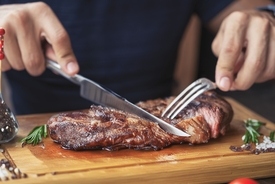No matter how diverse and loving your friendship group is, there's always one friend you've got that you're insanely jealous of. No, not because of their good looks, great job or anything else; but simply because they can seemingly eat anything they want and not gain an ounce of weight.
Whenever you see them, they're chewing on a chocolate bar or pushing a pizza down their throats, whereas if you even look at some pasta, you'll end up ballooning out, ripping through your clothes like the Incredible Hulk. What gives?! If you're anything like me, you'll take the easy way out and try to blame your genetics for your extreme sensitivity to weight gain from carbs, but rather than being a simple lame excuse, one geneticist thinks I might be onto something.
Geneticist Sharon Moalem says that there's a simple test you can carry out to determine how well your body can digest carbs, and therefore how much you can eat of them without gaining too much weight. It's called the 'cracker test'.
Outlined in his 2016 book The DNA Restart: Unlock Your Personal Genetic Code to Eat for Your Genes, Lose Weight, and Reverse Aging, Moalem's theory was put to the test by Xand van Tulleken (medical doctor and noted lover of carbs) and his merry band of medical students. "The truth is that some of you can eat as many carbs as you like, while others have to watch it," van Tulleken said, and I'm inclined to agree with him, but how exactly does this cracker test work?!
Unsurprisingly, this experiment begins with a cracker. Each medical student was asked to chew an unsalted cracker for 30 seconds, and raise their hand when they started to notice the flavour of the cracker change (if it started to taste sweet, for example). The experiment showed a range of results; one student raised their hand after 17 seconds, while another didn't raise their hand at all. But what does that mean?
"Seventeen seconds is quite fast," van Tulleken noted, saying that this was in line with Moalem's research about the cracker test.
"This suggests you have a high concentration of amylase enzymes in your mouth which are chopping up the big starch molecules into smaller molecules of sugar or sugar-like molecules that you can taste. That means that you should be able to eat a lot of carbs without having any problems."
That makes sense... I guess. But some of you are probably asking: if a quick change suggests you can eat carbs, then not noticing for a while (if ever) would indicate you'd balloon out with a small helping of french fries? In a word, yes: van Tulleken says that those who took longer to notice a change in flavour would most likely have a low concentration of amylase in their mouths, and this might cause them to " struggle eating carbs".
So there you go, folks. Why not try out the cracker test at home? If, after 30 seconds of chewing that cracker, you're not detecting anything different, then it might be worth cutting back on the carbs in order to lose weight. If you're tasting something sweet almost right away, then feel free to tuck into that garlic bread.

